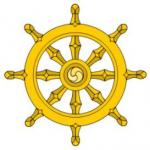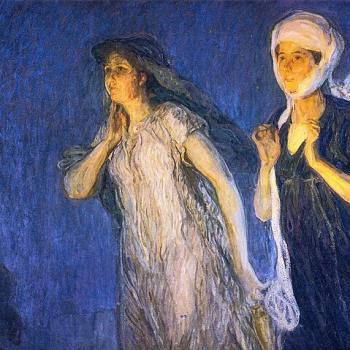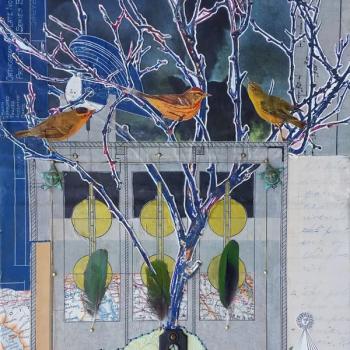 Spiders give many people the creeps. Yet with their ability to construct intricate webs out of fibers spun from their own bodies, we also find them fascinating.
Spiders give many people the creeps. Yet with their ability to construct intricate webs out of fibers spun from their own bodies, we also find them fascinating.
A spider’s web is sticky. Insects that fly into it become stuck. Their struggle to get free informs the spider and it moves easily over the web to put an end to their entangled victim.
The spider does not get caught in its own web. This isn’t because it has non-stick feet, but because it lays down non-sticky fibers that it can to see and walk freely upon.
All of this has made the spider an apt candidate for mythic tales and spiritual symbolism. For instance, the Hopi considered Spider Woman the earth goddess who created humans and the Navajo praised Spider Woman as a great benefactor of humans. Such myths are interesting, but here I only consider what the spider as a spiritual symbol means to me.
First Analogy – Entanglement
As the spider spins a web out of its own body, so the mind spins a kind of ongoing chatter. When organized and disciplined, this mental production can result in creations vastly more intricate than the spider’s web. When not engaged in an activity that demands our full attention, however, our mind often just chatters on and on with nothing productive coming of it.
Presumably, in the course of spider evolution, many of them failed to distinguish sticky from non-sticky threads, and ended up victim’s of their own webs. In the simple logic of natural selection, these spiders did not pass on their genes. Only those capable of distinguishing the sticky from the non-sticky fibers survived long enough to do that.
Like these unsuccessful spiders, we humans often get entangled in our mental productions. There are many examples of this kind of entanglement. Here are a few:
We all get entangled at times in our appetites. For example, I have a weakness for ice cream. A thought or image of ice cream enters my mind and if I don’t consciously say no to it, the idea sticks with me, growing larger, until I either go and get some ice cream or I consciously turn my full attention to disentangling myself from it. As with food, so with other appetites. Sexuality for instance or alcohol. These appetites can project a sense that we really need the object of the appetite or something will be wrong with us. Usually, however, this sense of need is just an illusion.
Similarly we get entangled in emotions, “tangled up in blue” as a great American poet puts it. Love, of course, is the most entangling of emotions. When we are in love, we might be convinced the one we love is projecting some kind of spell that makes us so enthralled. Yet the emotion is completely generated within our own nervous system. (Sorry to be so unromantic, but love is a mental construct, weaved within our nervous system, with the biological goal of passing on our genes. That we have a kind of religious attitude toward romantic love arises out of the unique history of Western civilization. This attitude scarcely existed before the medieval period.)
Fear is another emotion that we get caught up in. We hear a story about a burglary somewhere in the vicinity and we suddenly imagine it happening to us. In this case there is the possibility that it might happen, and precautions about such events are certainly worth taking. But we can lose all perspective on the probability of its happening. This can be a quite a problem, particularly for people who suffer from panic attacks and anxiety disorder.
Our desire for status is another, often very subtle way that we become entangled by our own mental constructs. Trying to “keep up with the Joneses” causes many people to fall into debt and to suffer the anxiety that such debt can cause. Even though we seem to have a deep instinct to maintain or raise our social status, we also can simply choose to not heed this drive. For example, I long ago made up my mind that I’m not interested in being friends with anyone who judges me by what I own rather than what I am. This may have hurt my social standing, but it has helped my finances.
Such are a few ways that objects that arise in our consciousness motivate us to act in ways that are not particularly productive or rational. Fortunately for us, getting entangled in our own imaginings is usually not a lethal situation, but it can be problematic.
Second Analogy -Liberation
While we can get entangled in our own mental productions, this same mind that creates the entanglements can also learn to recognize how it gets entangled and, like the spider with its web, learn how to stay free.
To a degree, this comes naturally as we get older. Most of us, for instance, become more prudent as we age. We learn to forsake immediate pleasure for longer term goals. In traditional cultures, religion and religious training play a role in this process. But to take this to its more extreme possibilities requires more dedicated practices and techniques. Meditation for example.
Most of us take our mental chatter for granted and consider it simply normal. But if we set ourselves the goal of learning to meditate we gain a different perspective. To meditate at all, we must learn to create a distance between our attentiveness and the chatter in our mind. This isn’t always easy.
If we try to think or will our way to a quieter mind, our thoughts and willfulness add to the chatter. So how can we do it? We have to just keep coming back to the effort until we finally succeed. This is sort of the equivalent of spider evolution. We have to fail a lot before we finally gain a degree of success. And then we have to fail in other ways before we begin to master the web of our mind and become more and more liberated from its mental constructions.
When we do gain some distance from the flux, we can begin to directly observe the workings of the mind. We can see how things arise in our mind, pull at our attention, and subside when we refuse them attention.
The mere fact that we can observe the workings of our mind reveals a couple of interesting things. First, it shows us that the self is a multiplicity. There are a variety of what might be called “voices” in our mind that call to us in various ways. These are such things as the appetites, emotions, etc. mentioned earlier.
Second, there is a kind of separation between that which is observing and that which is observed. In the analogy that we are working with here, this is the difference between the spider and the web that it has constructed out of itself. (In the meditative schools of India, some have made of this difference a fundamental dualism and others have emphasized that although there is a difference, underlying this difference is an essential unity. I’m with those who emphasize an underlying unity.)
In the Western traditions, the part of the mind that can contemplatively pull itself from the flux of ordinary consciousness is associated with reason, particularly that aspect of reason by which we govern the self. Turned outwardly, the attainment of a degree of detachment allows us to have a more objective, rational view. This is the kind of mind that helps a person be a good field observer or to make objective judgments about legal or scientific questions.
Turned inward it allows us to dwell within our own being in a state of peace and contentment. In India the word ananda is often used to characterize this state. In Stoicism it is called ataraxia. In Christian terms, this mental recognition is what allows us to refrain from the temptations of our many appetites (the voice of the devil) such as the “sins” of lust, greed, envy and hate.
The value of this ability to hold our self apart from temptation and entanglement has been sufficiently extolled by the various religious and classical traditions, so I will not add to it here.
The modern secular West has a rather split view on this. On the one side, we believe that indulging our appetites and emotions allows us a greater enjoyment of life. At the same time, we are concerned with a number of problems created by such indulgence, for example obesity, even in young children; sexual groping, assault and even rape; widespread anger and the expression of this anger in violence; and the prevalence of drug and other forms of addiction.
That these might be “spiritual” problems, problems which require an individual’s dedication and sacrifice to get beyond, is rather distasteful to the secular view. But I throw out the suggestion that the analogy that I am portraying here is quite relevant to these problems.
Summary
In summary, the spider serves as a spiritual symbol in two ways: one, as the way we become entangled in our own mental productions, not recognizing their mirage like character. In this sense, the spider is like the idea of Maya in Hindu and Buddhist mythology. Second, it also is symbolic of our ability to become liberated from this entanglement and like the spider move easily over the web of our mind. Such, as least, is the meaning the symbol has for me.
















